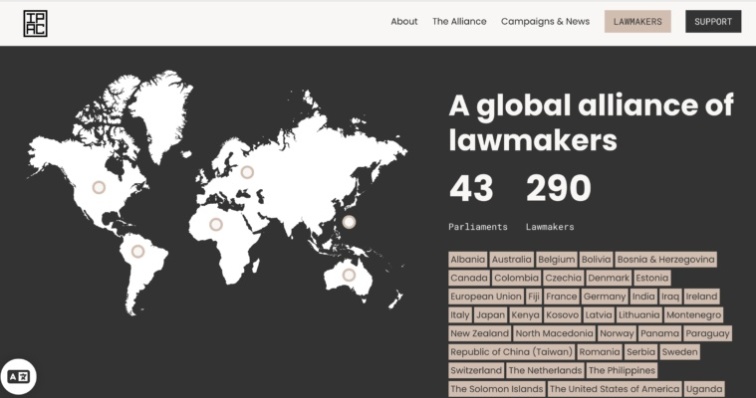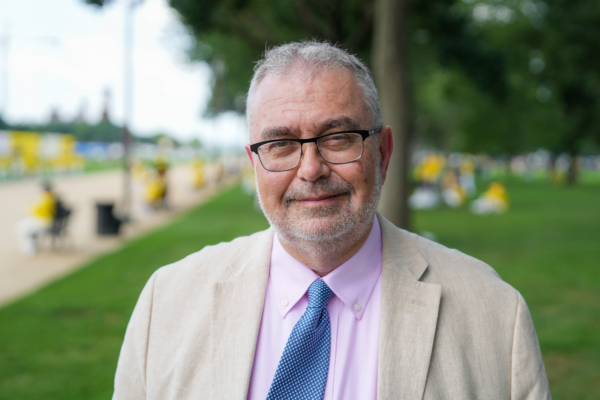On July 18, 2021, Falun Gong practitioners took part in a parade in Brooklyn, New York, marking the 22nd anniversary of the persecution of Falun Gong. (Chung I Ho/The Dajiyuan)
[People News] On November 12, the Inter-Parliamentary Alliance on China (IPAC) issued an official statement condemning the Chinese Communist Party’s heinous practice of harvesting organs from living people. It explicitly put forward six legislative recommendations to prevent individuals, institutions, or governments in various countries from assisting the CCP in the extraction of organs from living humans.
According to a report by The Dajiyuan reporter Li Chen, Dr. Xiaoxu Sean Lin, Executive Director of the Consilium Institute in New York State, USA, who attended the IPAC summit, told The Dajiyuan that the statement passed by IPAC is “tremendously significant.”
Piero Tozzi, Deputy Staff Director and attorney for the Congressional-Executive Commission on China (CECC), also told The Dajiyuan that IPAC’s statement is “extremely important.”
IPAC is an international organization composed of parliaments from 43 countries and the European Union, with more than 290 cross-party legislators.

Screenshot of the IPAC website. (IPAC/The Dajiyuan)
Strong Condemnation of the CCP’s Heinous Crime of Forced Organ Harvesting
In its official statement, the Inter-Parliamentary Alliance on China condemned the CCP’s forced organ harvesting.
The statement reads: “Multiple credible reports and widespread international criticism indicate that organ harvesting and organ trafficking occur within China with state sanction or acquiescence.”
“We—the members of the Inter-Parliamentary Alliance on China—at the Brussels summit on November 8, 2025, strongly condemn the heinous act of forced organ harvesting.”
The statement says that legislators from various countries will promote legislation to stop this atrocity. “We declare that we will promote legislation in line with international best practices to prevent, prohibit, and punish forced organ harvesting and organ trafficking.”
IPAC Statement “Tremendously Significant”

On July 17, 2025, Piero Tozzi, then Staff Director of the Congressional-Executive Commission on China (CECC), attended a large rally on the National Mall near Capitol Hill in Washington, D.C., marking the 26th anniversary of the persecution of Falun Gong. (Samira Bouaou/The Dajiyuan)
CECC Deputy Staff Director Piero Tozzi told The Dajiyuan that the IPAC statement is “extremely important,” and its influence will continue to “amplify.”
Tozzi said, “IPAC is a gathering of lawmakers from around the world.”
“The IPAC meeting has a stronger and further-reaching influence because it is not from just one country, but from lawmakers across the globe.”
“That’s why the IPAC meeting is so important; that’s why what happens at IPAC is extremely significant.”

In Warwick, New York, on March 22, 2023, (from left to right) David Zhang, Sean Lin (second from left), Chris Chappell, and Kay Rubacek attended a local seminar on “Beware of CCP Threats.” Signs of the CCP regime expanding its influence have become increasingly evident on YouTube, especially in English-language programs. (Cara Ding/The Dajiyuan)
Dr. Sean Lin, Executive Director of the Consilium Institute in New York State, who also attended the IPAC meeting, told The Dajiyuan that the statement is “tremendously significant,” and one important aspect is that the “Inter-Parliamentary Alliance on China (IPAC) acknowledged and accepted the findings of the China Tribunal.”
“The conclusion of the China Tribunal has now been formally recognized by so many lawmakers from different countries,” he said. “This statement represents the voice of all IPAC members.”
In March 2020, the independent people’s tribunal based in London—the China Tribunal—issued its final written judgment, concluding:
“(Live) forced organ harvesting has been committed for years throughout China on a significant scale, and Falun Gong practitioners have been one—and probably the main—source of organs.”
“The focused persecution and medical examinations of the Uyghur population are more recent developments.”
“Any government which interacts in any substantial way with China (the CCP) in the areas of doctors, medical institutions, industry, tourism, aviation, finance, law, pharmaceuticals, insurance, education, or the arts must now recognize that they are dealing with a criminal state.”
Lawmakers from Multiple Countries Pledge to Push for Legislation
Dr. Sean Lin explained, “At this IPAC meeting, on various China-related issues, this (legislative framework to stop organ harvesting) was the first and most important topic discussed. And it was passed unanimously.”
Dr. Lin said the subsequent influence will also be significant. “Lawmakers from each country can return home to push forward legislation to stop organ harvesting and safeguard the ethical standards of their medical systems.”
“After the meeting, several lawmakers told us that they will definitely go back and advance this legislation,” he said. “They are considering how to safeguard medical ethics and uphold the human rights and ethical standards that the medical community must follow.”
Six Legislative Recommendations
IPAC’s statement put forward six legislative recommendations:
-
Establish criminal offenses prohibiting patients from traveling abroad to receive organs of unknown origin or without clear voluntary consent from donors;
-
Require that anyone involved in or facilitating (live) organ harvesting or trafficking be placed on targeted sanctions lists;
-
Require medical professionals and hospitals to report suspected cases of forced organ harvesting or organ trafficking;
-
Establish a national transplant registry to ensure transparency and oversight—including transplants received by citizens overseas;
-
Prohibit the use of public funds to conduct joint research, training, or cooperation with foreign institutions involved in organ harvesting;
-
Prohibit medical institutions from cooperating with foreign countries in the field of transplant medicine without first conducting human rights due diligence.
Dr. Lin said, “How lawmakers push this forward—of course each country can adjust the legal language or legislative priorities. But this Inter-Parliamentary Alliance (IPAC) has essentially provided a legislative framework.”
“Each country’s legal system is different. Some countries have universal jurisdiction—meaning that once such a law is passed, it applies even outside their borders.”
Dr. Lin said that as long as any country advances such legislation, it will drive many developments forward. “Once there is a legal foundation, investigations can be conducted against the CCP (and individuals, institutions, or governments involved in organ harvesting).”
“As long as lawmakers are willing to introduce a bill, the process alone will shake the transplant and medical community. And in turn, it will also deter the CCP.”
△










News magazine bootstrap themes!
I like this themes, fast loading and look profesional
Thank you Carlos!
You're welcome!
Please support me with give positive rating!
Yes Sure!